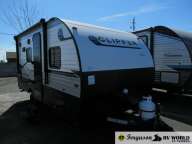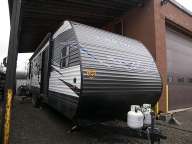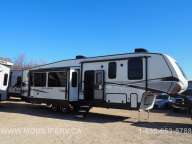Choosing the right RV can be a tough decision, especially when you have to pick between a travel trailer and a motorhome. Each option has its own set of advantages and drawbacks. Your choice will depend on your travel habits, budget, and personal preferences. In this blog post, we will explore the differences between travel trailers and motorhomes to help you make an informed decision. Let's dive in!
Understanding Travel Trailers
What is a Travel Trailer?
A travel trailer is a towable RV that you attach to a hitch on your vehicle. They come in various sizes and styles, offering different amenities based on your needs. Popular brands include Hemisphere, Salem, Bullet, and Micro Minnie. Travel trailers are versatile and can be detached from your vehicle, allowing you to explore your surroundings without having to pack up your entire home.
Benefits of Travel Trailers
- Cost-Effective: Travel trailers are generally more affordable than motorhomes. You can find a variety of models that fit your budget.
- Versatility: They offer a range of options from compact trailers to large, luxurious models.
- Easy to Tow and Detach: You can tow a travel trailer with many types of vehicles. Once you reach your destination, you can unhitch it and use your vehicle separately.
Drawbacks of Travel Trailers
- Requires a Tow Vehicle: You need a vehicle capable of towing the trailer.
- Setup and Takedown: Setting up a travel trailer can be time-consuming.
- Limited Maneuverability: Towing a travel trailer can be challenging, especially in tight spaces.
Understanding Motorhomes
What is a Motorhome?
A motorhome is a self-contained RV that combines driving and living spaces into one unit. Motorhomes come in three classes: Class A (the largest and most luxurious), Class B (the smallest and most fuel-efficient), and Class C (a mid-sized option). Motorhomes offer convenience and comfort, making them a popular choice for many travelers.
Benefits of Motorhomes
- All-in-One Convenience: No need to tow; everything is in one vehicle.
- Comfort and Luxury: Many motorhomes come with high-end amenities like full kitchens, spacious bathrooms, and comfortable sleeping areas.
- Easy Setup and Mobility: Motorhomes are quick to set up at campgrounds and easy to drive from one location to another.
Drawbacks of Motorhomes
- Higher Costs: Motorhomes are more expensive to buy and maintain.
- Larger Size: Their size can make driving and parking difficult, especially in crowded areas.
- Storage Needs: You need a place to store your motorhome when not in use.
Comparing Travel Trailers and Motorhomes
Cost Comparison
- Purchase Price: Travel trailers are generally cheaper than motorhomes. A basic travel trailer can be much more affordable than even a modest motorhome.
- Maintenance and Insurance: Motorhomes often cost more to maintain and insure due to their complex mechanical systems and higher initial value.
- Fuel Efficiency: Travel trailers can be more fuel-efficient, depending on the tow vehicle. Motorhomes, especially larger Class A models, tend to consume more fuel.
Ease of Use
- Driving and Maneuvering: Motorhomes are easier to drive but can be challenging to park due to their size. Travel trailers require a tow vehicle and can be tricky to maneuver, especially in tight spaces.
- Setup and Breakdown: Motorhomes have quicker setup times since you just park and you're ready to go. Travel trailers require more setup time, including leveling and connecting utilities.
Space and Comfort
- Living Space and Amenities: Motorhomes offer more luxurious living spaces with integrated amenities. Travel trailers provide a cozy, compact environment, which can be just as comfortable depending on the model.
- Sleeping Arrangements: Both options offer various sleeping setups. Motorhomes often have more luxurious beds, while travel trailers might have convertible spaces to maximize room.
- Kitchen and Bathroom Facilities: Motorhomes typically have larger kitchens and bathrooms, offering more convenience and comfort.
Versatility and Flexibility
- Travel Trailer: One of the main advantages is the ability to detach and use the tow vehicle separately, giving more flexibility for day trips and errands.
- Motorhome: Combines driving and living, making it easier to move around without detaching. This can be convenient for those who prefer an all-in-one solution.
Suitability for Different Travel Styles
- Weekend Trips vs. Long-Term Travel: Travel trailers are great for frequent short trips, offering flexibility and ease of use. Motorhomes are ideal for long-term travel, providing all the comforts of home on the road.
- Solo Travelers, Couples, and Families: Motorhomes are better for larger groups, offering more space and amenities. Travel trailers are versatile for solo travelers, couples, and small families.
- Adventure Seekers vs. Leisurely Travelers: Motorhomes offer more comfort for leisurely trips, with luxurious amenities and ample space. Travel trailers suit adventure seekers who need a practical and flexible solution.
Making the Right Choice for Your Needs
Assessing Your Travel Habits
- Frequency and Duration of Trips: Think about how often you plan to travel. Are you planning weekend trips or extended vacations? Travel trailers are great for frequent short trips. They are easy to hitch and go. Motorhomes are better for longer trips because they have more amenities and are more comfortable for extended stays.
- Typical Travel Destinations: Consider where you plan to travel. If you enjoy camping in established campgrounds, either option will work well. If you prefer exploring remote areas, a travel trailer might be more convenient because you can detach it and use your tow vehicle for exploring.
Considering Your Budget
- Upfront Costs and Long-Term Expenses: Factor in the initial purchase price and ongoing maintenance costs. Travel trailers generally have lower upfront costs and are cheaper to maintain. Motorhomes have higher initial costs and can be more expensive to maintain.
- Financing Options: Look for financing plans that fit your budget. Many RV dealers offer financing options for both travel trailers and motorhomes.
Evaluating Your Vehicle Requirements
- Tow Vehicle: Do you have a vehicle capable of towing a travel trailer? If not, you might need to invest in a suitable tow vehicle.
- Comfort Driving Larger Vehicles: Are you comfortable driving a larger motorhome? Motorhomes can be challenging to drive and park, especially in crowded areas.
Thinking About Future Plans
- Upgrading or Changing Your RV: Consider if you plan to upgrade or change your RV in the future. Travel trailers often have a higher resale value and are easier to upgrade or trade-in.
- Resale Value: Think about the resale value of the RV you choose. Travel trailers generally hold their value better than motorhomes due to lower initial costs and simpler maintenance.
Travel Trailer vs. Motorhome Comparison
| Criteria | Travel Trailer | Motorhome |
|---|---|---|
| Initial Cost | Lower | Higher |
| Maintenance Cost | Lower | Higher |
| Fuel Efficiency | More fuel-efficient (depends on tow vehicle) | Less fuel-efficient |
| Ease of Use | Requires a tow vehicle, setup time needed | All-in-one, quick setup |
| Living Space | Compact, cozy | Spacious, luxurious |
| Sleeping Arrangements | Convertible spaces | Luxurious beds |
| Kitchen and Bathroom Facilities | Smaller kitchens and bathrooms | Larger, more comfortable facilities |
| Versatility | Can detach and use tow vehicle separately | Integrated driving and living |
| Best for Travel Style | Frequent short trips, adventure seekers | Long-term travel, leisurely travelers |
FAQs About Travel Trailers and Motorhomes
- What are the best travel trailers for beginners?
- Brands like Micro Minnie and Bullet are great for beginners.
- How do I maintain and care for my travel trailer or motorhome?
- Regular inspections and maintenance are key. Check for leaks, service the engine, and clean the interior.
- What should I pack for an RV trip?
- Essentials include bedding, kitchen supplies, food, clothes, and tools.
- Can I live full-time in a travel trailer or motorhome?
- Yes, many people live full-time in RVs. Motorhomes offer more comfort for long-term living.
- How do I choose the right RV insurance?
- Look for comprehensive coverage that includes collision, liability, and personal belongings.
Conclusion
Choosing between a travel trailer and a motorhome depends on your needs, budget, and travel habits. Both options offer unique benefits and drawbacks. Travel trailers are cost-effective, versatile, and great for frequent short trips. Motorhomes provide luxury, convenience, and are ideal for long-term travel. Smithville RV offers a wide range of travel trailers and motorhomes, making it easy to find the perfect RV for your adventures.
If you're in the market for an RV, visit Smithville RV. Their friendly staff and extensive inventory will help you find the perfect RV to suit your needs and budget. Happy camping!





























